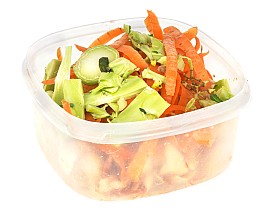The Ultimate Urban Composting Guide
 Does the idea of composting fill your head with images of a large backyard and a big compost bin? It's time to rethink what composting means. Today, everyone can compost, even in a bustling urban center. If you think your city balcony is too small for composting, think again. Even a fire escape is big enough for a mini compost bin. There are many compost options that allow city dwellers to save valuable landfill space.
Does the idea of composting fill your head with images of a large backyard and a big compost bin? It's time to rethink what composting means. Today, everyone can compost, even in a bustling urban center. If you think your city balcony is too small for composting, think again. Even a fire escape is big enough for a mini compost bin. There are many compost options that allow city dwellers to save valuable landfill space.
Read on to learn how to compost in the city - without attracting pests or creating a bad smell.
Bins, Pails and Buckets
Newfangled compost bins are perfect for city dwellers. For under $40, you can buy a chic and functional compost pail that doesn't take up much space -- whether bamboo, ceramic, or stainless steel. These pails have tight-fitting lids to keep pests out, and carbon filters so they stay odor-free. Most come in different sizes and shapes to suit your needs. They're attractive and clean enough to keep on a countertop, or you could store one on your balcony or fire escape.
If you're living in a small space where moisture and unpleasant odors proliferate quickly, it's imperative to buy a compost pail with a carbon filter. DIY solutions are generally a good way to save money, but your average plastic Tupperware-type container will inevitably generate bad smells. If you must use a container other than a compost pail with a carbon filter, store the compost in the freezer. This will prevent your apartment from stinking of week-old vegetable peels.
Vermiculture
Worms are fascinating creatures that immensely enjoy your leftover dinner scraps. Red worms will consume food waste, and later excrete it in the form of small nutrient-packed pellets. Worm castings are the best kind of soil that you can provide to your plants, which is why so many "urban farmers" choose this form of composting over all others. In order to become a worm composting enthusiast, you will need the following objects:
- A proper container
- Bedding, like strips of old newspaper
- Non-fat food scraps
- Worms (about 1000)
- Water
- A great worm composting guide book (Follow the book's steps carefully; worm compost requires the right balance of water, air, bedding, and food.)
Yes, I know what you're thinking: "No way am going to keep a bin full of worms on my balcony! Eeeewww!" The truth is, vermiculture creates almost no mess, and it's possible to compost without ever having to touch the worms. No one needs to know what's inside that large Rubbermaid bin on your porch, although divulging its contents will provide some environmental inspiration to your cocktail party guests.
Guerrilla Composting
Urban dwellers who have no place to empty their compost bins are taking matters into their own hands. These eco-enthusiasts have been known to dump compost waste into a nearby bin in the wee hours of the morning. Aside from this sneaky tactic, scope out your city for the following compost dumping locations:
- Urban Gardens: Head over to your nearest urban gardening center, and ask about donating your compost. Also, speak with some local professional gardeners -- many of them will be glad to have your nutrient-rich compost!
- Horticulture Centers: Any savvy horticulturalist knows the value of good compost. See if you can bring yours to a nearby horticulture center once or twice a week.
- Neighbors: Does your next door neighbor have a garden? If so, educate your neighbor on the importance of compost, and then ask if they'd like to have yours. Just make sure to gain your neighbor's permission before you dump out your compost pile!
- Your Own Container Garden: Nothing beats the taste of vegetables and herbs grown in your own container garden. You don't need a large space or lots of land to produce your own goods. All you need is a nice window spot or balcony. Just think -- you already have the compost!
- Public Places: Guerrilla composters tend to find public parks, gardens, and grassy areas that look like they could use a bit of attention. While this form of composting is an entirely noble feat, it's best to do your compost dumping during the evening hours - this way, you'll avoid a large city fine!
- Craigslist and Other Public Forums: Why not donate your compost? Sell it or give it away to those that need some top-notch soil. You'll be surprised at the number of responses you get!
Smells, Pests and Other Concerns
Containers that have been specially made for urban composting are often equipped with anti-odor features. Some of these items contain carbon filters that must be changed once every couple of months, while others contain natural deodorizers.
Worm compost piles don't actually smell at all, though it's important to control the amount of food that your worms eat. By feeding your worms a small amount of food waste at a time, you can ensure that rotting food won't be left lying around.
Generally, small pests are not a problem when it comes to urban composting. However, it's important to keep tight lids on compost jars, not to pile compost higher than the container that you are using, and locate your compost container in a secluded area.
Updated July 19, 2018.
Looking for a Pro? Call us (866) 441-6648

Landscaping Average Costs
Landscapers Experiences

Tree Removal For The Last Part Of A Poor Old Mulberry

Yard Cleanup And Lawn Care Service With A Great Work Ethic



